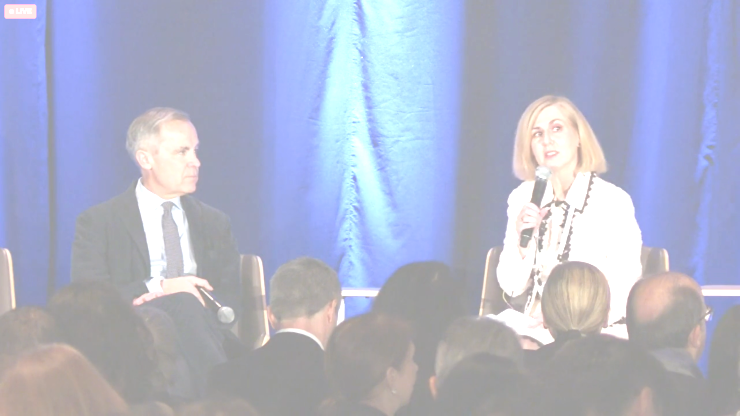Mark Carney, former governor of the Bank of Canada and Bank of England, and the current U.N. special envoy for climate action and finance, said the time for largely voluntary sustainability reporting today must yield to a new era of mandatory disclosure if the goals of the corporate social responsibility movement are to be enacted.
Speaking with Sue Lloyd, vice chair of the International Sustainability Standards Board at its inaugural symposium in Quebec, Carney noted that sustainability reporting, especially with regard to climate change, has come a long way since the Taskforce on Climate-related Financial Disclosures, a Financial Stability Board project that launched in 2015. Carney said that while it was an important first step, it was contending with a highly fragmented sustainability landscape that made it difficult to marshal a real global effort.
"We needed to move toward a common standard from the patchwork of over 400 different approaches that existed at the time, each of them well-meaning, each of them different, none of them comprehensive, none of them clearly compatible, none of them fully reliable, none of them — if I may say with respect — united in the principle that ensuring this information is decision-useful," he said.

The TFCD, he said, was conceived of as something "by the market, for the market," something it shares with the ISSB's value-oriented focus. The purpose of this framing was to create something that investors could actually use to make capital allocation decisions. They might have different opinions on how severe climate change will be (especially earlier in the project's life, when there were more people who doubted the extent of the crisis) or what they could do, but at the very least they would have the information before them. This was why the TCFD at first took what he said was a light touch when it came to its initial work, including setting the tone for largely voluntary action from entities. The world has moved on, however, Carney said, and how we think of sustainability disclosures must too.
"It was very obvious to [2021's U.N. Climate Change Conference in Glasgow, COP 26] that we are getting to the limits of voluntary actions on this. There was not a comprehensive adoption of these standards … there was expertise that wasn't resident in the private sector," he said.
This is why many players in this space, including Carney, believe it is time to move to mandatory disclosure, something he says the ISSB can play a key role in eventually implementing. He envisions not only companies and their boards reporting climate information but also what their plans are for mitigating the impacts it might have on their bottom line. He lamented how much it seems companies have resisted doing this for years, underscoring the need for mandatory disclosures.
As the governor of the Bank of England, Carney said they got a lot of pushback from banks when asking them to do stress tests for how they would be affected by a 1.5 degree rise in average global temperature. This was despite the fact that developing such strategies "is the law of the land in the U.K., literally!"
He was puzzled why banks balked so much.
"How can you, as a board, not be planning for what your bank would look like under that scenario, not even thinking about it, not even analyzing it, as a worst case? And that would be the end of that conversation, because it's nonsensical. There's so much more that comes out when you do that," he said.
This is not to say he believes companies should be immediately thrown into the deep end of mandatory sustainability reporting with no support. He said he understands the need to build capacity, as this sort of reporting can be complicated and require specialized talent. The ISSB, through its outreach and engagement with stakeholders throughout the world, has done a great deal already to help build that capacity, and he expects companies will grow even more competent with sustainability disclosures as the board continues its work.
There is certainly room for things like transition plans and infrastructure buildups, and in fact he said the Financial Stability Board is working with other organizations on these very things. But, he cautioned, they should not take too long.
"I don't want it to take seven years for that to happen," he said. "We have examples of what we can move when we set our minds to it with the ISSB."





